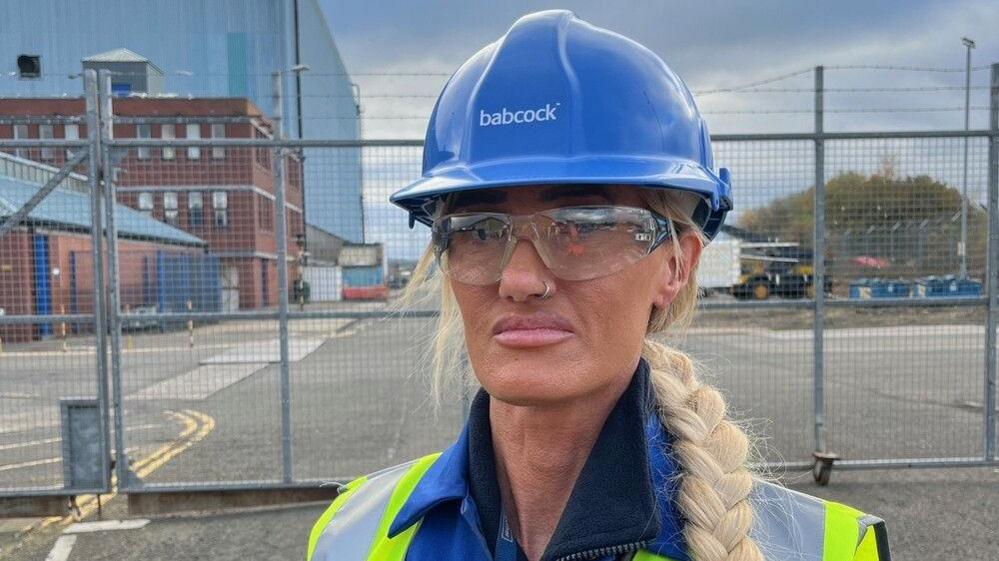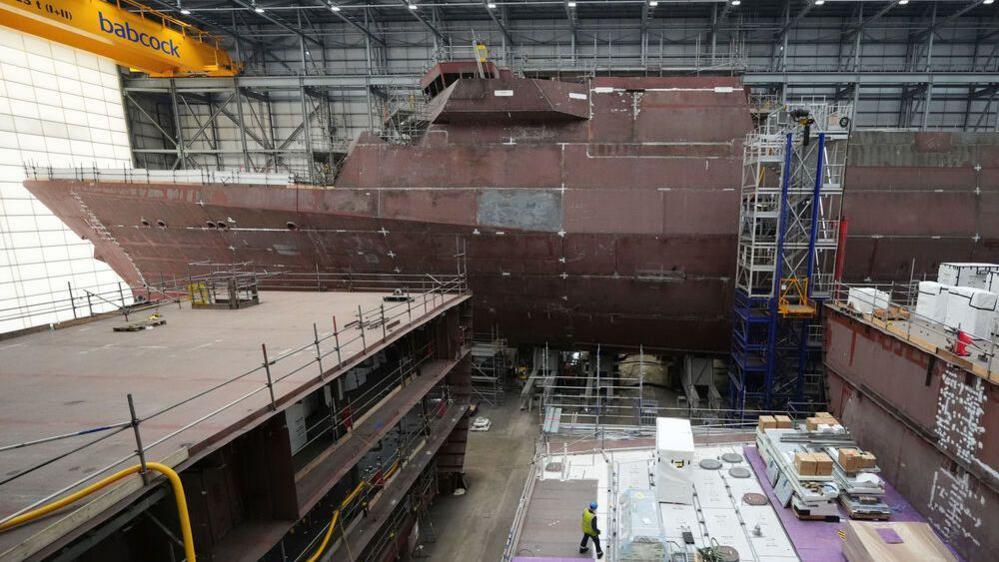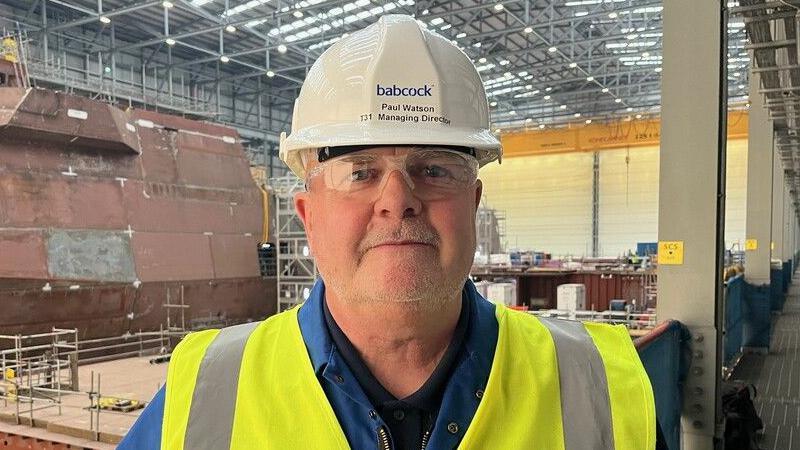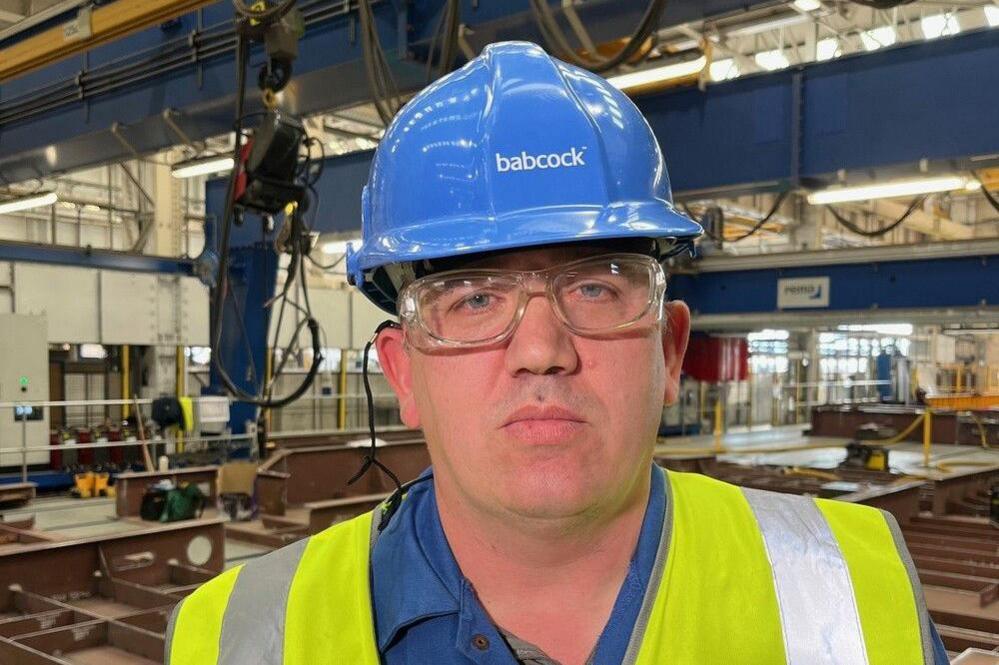'I went from being a cleaner to building a warship'

Donna Dryburgh had worked as a cleaner on the yard for six years
- Published
Donna Dryburgh never thought she would build warships for a living.
Until two years ago, she worked as a cleaner at the shipyard in Rosyth, Fife.
She enjoyed the work, but wanted a change. Then she saw a job advert.
The defence firm Babcock was looking for people to become production support operatives, or PSO's - a new role for staff in their shipbuilding operation.
Donna applied, got the job, and took to it like a duck - or a warship - to water.
"I’ve now had a lot of training," she said. "The welding was the best part of it for me.
"I never thought I’d ever be able to weld in my life, but it's been fantastic and I'm quite surprised at myself.
"It's been a really exciting journey for me, watching the ships being built."
Donna said it could be quite "daunting" for women to go into the industry.
"People look at it as a man’s job, but of course women can do that job," she said. "So we’re getting more women coming through."
She's now in a specialist role, fitting masks for welders - a crucial part of the yard's safety operation as it delivers warships for the Royal Navy.
"Everybody who comes on site gets fitted with respiratory protection to go out and do their job safely, so it’s an important job to get a seal on somebody’s face," she said.
"You have all sorts of different shapes and sizes coming in here."

Babcock constructs its warships in the Venturer building in Rosyth
Like many employers, Babcock faces intense competition for workers.
Scottish government figures showed that in October, a quarter of firms reported experiencing a shortage of staff.
The pandemic and Brexit left many employers without the skilled workforce they needed.
So Babcock have turned to unusual tactics.
More than 2,000 people work on site. The company has now taken on 200 workers in PSO roles.
They start in support roles, and after training and experience, they move on and up.

Paul Watson heads up the shipbuilding programme in Rosyth
Paul Watson is managing director of the Type 31 programme, which is working to deliver Royal Navy warships.
"The pandemic was one of the biggest challenges at the start of the programme," he told BBC Scotland News. "It just wasn't possible to bus people from around the country onto the site.
"That created a bigger opportunity for the local community here."
Paul said the industry had been "fiercely competitive" over the past five years, with two large shipbuilding programmes on the west coast, and another on the east coast.
"There's also lots of industrial work going on in Scotland's renewable sector," he added.
"So we have to think about how we tackle that capability gap quite differently from what we've been doing before."
For the new workers, he said: "It’s a mix of training - some before they come on site, then there's the job training - that's 'elbow training' alongside the skilled teams.
"Fifty of the PSO's have gone onto higher skilled work in welding, fabricating and health physics monitoring, so there's a pathway for them too."
Role of forgotten women shipyard workers explored
- Published9 November 2024
Scotland's unemployment rate down over winter
- Published16 April 2024
Babcock's Rosyth facilities are well guarded, and sit behind a high barbed wire fence.
In recent years, the workforce took on some huge assembly jobs - most notably, two Queen Elizabeth class aircraft carriers - the biggest warships ever to serve with the Royal Navy.
They’ve sailed, but work continues in a vast blue box - the Venturer build hall.
It's 147m (482ft) long, and 42m (138ft) high, so there's space inside for two of the Navy's newest warships - Type 31 frigates - side by side.
One day soon, these 6,000 tonne vessels will help lead the Navy's air defence and submarine hunting operations.
The huge hall is a hive of activity, with loud clanging and banging and showers of sparks thrown out by welders.

Paul Mclelland started in the industry after working as a baker then a window fitter
Alongside them is Paul Mclelland, who worked as a baker and then a window fitter.
But when he reached 52, he was looking for a career change and thought his chance had "slipped by".
That brought him to the shipyard, retraining and upskilling for a specialist PSO role, supporting the welders with their "local exhaust ventilation" – the systems which stop them breathing in fumes.
He told BBC Scotland News he had not looked back since he got the job.
"I enjoy coming into work," he said. "That's half the battle when you get out of bed in the morning.
"You come to work and you know you’re going to enjoy it. So it’s good.
"I wish I'd come here earlier."
Related topics
- Published26 March

- Published13 August 2024
